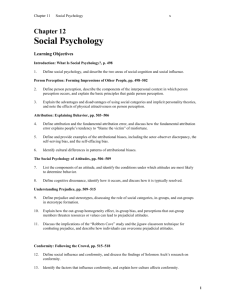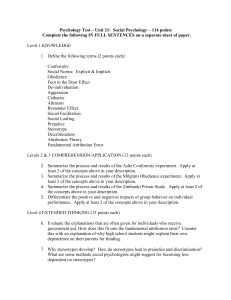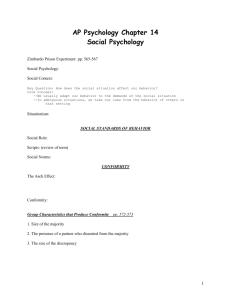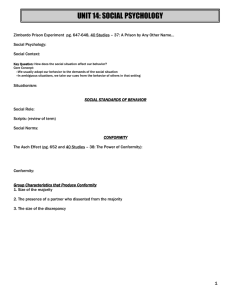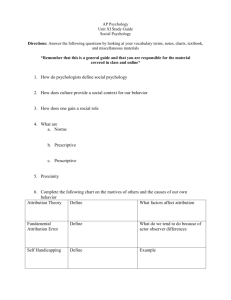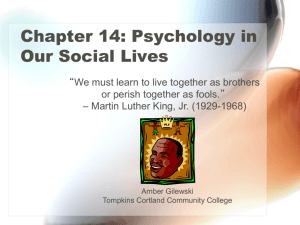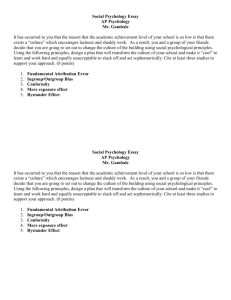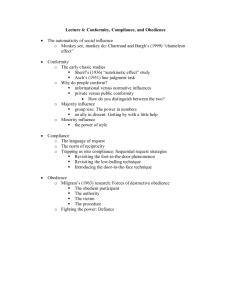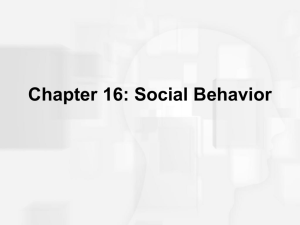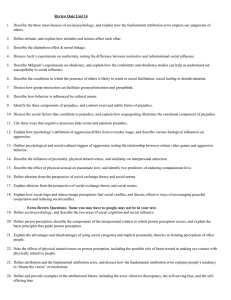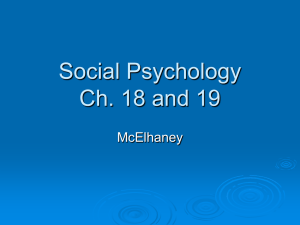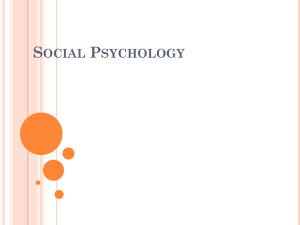Social Psychology: Interpersonal and Group (Chapter 15)
advertisement
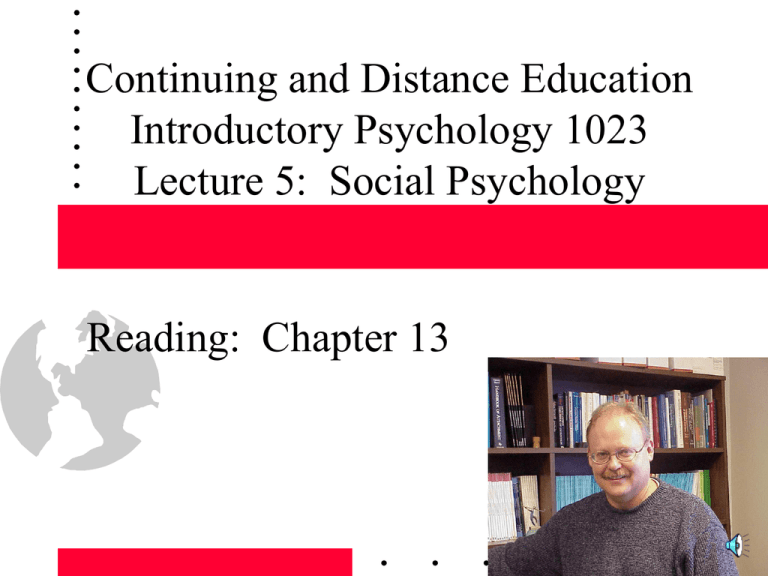
Continuing and Distance Education Introductory Psychology 1023 Lecture 5: Social Psychology Reading: Chapter 13 Social Psychology: Why do people do what they do? Attributions • People are motivated to seek causes and explanations of behavior related to situations and dispositions • You ask someone to dance. They say no. Why? – Because I am a loser (personal attribution) – Because they are talking to friends or do not like the music (situational attribution) • Someone bumps you in line. Why? – Because they are an !@?&#!!.. This is a fundamental attribution bias where we over-emphasize internal causes behavior – They may have tripped and are not “evil” Self-serving bias • Internalize success and externalize blame • Winning a hockey game because “we’re a good team”, losing because they were “lucky” or you “did not get the bounces” • Self-handicapping is the opposite, e.g., pass a test because “it was easy”, fail “because I am stupid” • Just-world hypothesis: People make sense of senseless events based on their biases, e.g., tornado hits a particular region, people say it was fate and deserved by those people Bystander studies • The murder of Kitty Genovese: No one intervened • The larger the group, the less likely someone will intervene – Someone falls down in front of you at the bus stop. You are more likely to help them if you are alone than if waiting with other strangers. • Bystander effect leads to diffusion of responsibility, bystander apathy – Observers need to notice and define the emergency, take responsibility, and act Deindividuation • Once a sense of individual identity is lost, internal constraints against socially prescribed behavior are reduced • Negative examples – Urban riots and angry mobs commit open vandalism and theft – Unknown women in hoods act very aggressively • Positive examples – Visitor to a small town may be very friendly as they are unknown – Talking to strangers on a bus – Helping in an emergency, as in Swiss Air Disaster Group Competition • Unfavorable attitude towards other groups based on weak or incorrect evidence • Ethnocentrism: Belief that one’s own cultural group is superior to others • Groups compete, even when artificially created, e.g., summer camp groups or cabins • Belief that everyone from another group is alike, e.g., residences • These issues apply to cultural/ ethnic groups • Why? Competition, identity, modeling – Reduced by contact between equals involved in cooperative activity Compliance and Obedience • Compliance: Doing what someone has asked you to do – e.g., get on protest bus: what are we protesting? • Obedience: Following orders – e.g., we can be cruel to others when ordered to be so • Cults are examples of conformity, compliance, and obedience out of control Stereotypes • Summary impression of a group – We exaggerate differences between groups, e.g., two urban gangs feel very different – Underestimate differences within the other group “They are all alike” • Usually strong because we encode information consistent with our stereotypes, e.g., teenagers “hang out” in groups • We often associate with people that hold similar stereotypes that reinforce one another Basic principles of a group • • • • A number of individuals who interact Social facilitation: joggers speed up Social inhibition: first tee in golf Arousal facilitates well-learned responses but inhibits novel responses – Exam stress wipes out newly learned material but can enhance well-learned strategies and material – Distraction-conflict: “Hey Mom watch!” • Conformity: People tend to go along with the group, want to be liked, get along, identify with others Other group processes • Social loafing: Individual energy expended goes down as the number of people goes up, e.g., your science partner “goofs off” in group of 4, but not 2 • Illusion of unanimity: Group polarization, when in groups, views become extreme • Conflict resolution: Is this at the expense or benefit of yourself and the other side? • Groupthink: Isolated, biased leadership, and high stress can lead to unusual and close-minded decisions. Dissenters have pressure to conform
